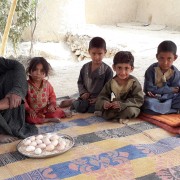Speeches Shim

“It is no longer business as usual. Coronavirus is with us in Afghanistan”, says Dr. Hizbullah Jalil, a Zoonotic Disease Surveillance Officer, leading the Ministry of Public Health’s team investigating suspected COVID-19 cases in Afghanistan. The country is fighting several enemies: lack of security, poverty, low literacy levels, vaccine-preventable diseases, and now the highly contagious coronavirus (COVID-19) outbreak.
Twenty-six exporters of Afghanistan’s finest fruits, nuts, juices, saffron, and spices are showcasing their products for international buyers at the world’s largest annual food and hospitality trade show—Gulfood Expo Dubai—from February 16 to 20. For the 10th consecutive year, the United States Agency for International Development (USAID) is supporting the participation of Afghan agribusinesses.

In Afghanistan, women make up 34 percent of teachers (Source: The World Bank 2017). This limits girls and women from participating fully in society, as some families prohibit their daughters from interacting with male teachers. One Afghan woman has been changing this trend her entire life.

Fatima Abbasi graduated from Ghazni University three years ago as the only female horticulture student in her class. She still remembers the discouragement from her fellow students telling her to forget her studies, forgo her ambitions, and to go back home. She nearly gave up. Worse, after graduation, with no work experience, she could not find a job in this male-dominated sector.

Unemployment and underemployment is a pervasive problem across Afghanistan, fueled by decades of conflict. While urban centers around the country have more employment and business opportunities, marginalized segments of population face additional challenges finding employment. USAID has projects specifically focused on creating job and business opportunities for marginalized populations, including internally displaced persons (IDPs), returnees, women, and youth.


Comment
Make a general inquiry or suggest an improvement.